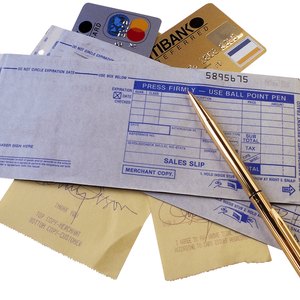
When a receipt displays an entire credit card number, it poses a security risk if it's lost or stolen. Someone can easily use that information to commit fraud. Although there are federal and state laws on credit card receipts and consumer protection, certain situations allow the display of the entire number.
Merchant Requirements
According to the Fair and Accurate Credit Transactions Act of 2003, merchants who process electronic credit and debit card transactions must make certain their terminals and point-of-sale and invoice systems truncate, or shorten, card numbers on customer receipts. Some states require the same on merchant copies. Receipts must reveal no more than a card number's last five digits and no expiration date.
Transaction Exceptions
The law does not require truncation on handwritten or manually imprinted receipts used for processing transactions at a later time. Some merchants can’t afford electronic processing equipment or receive only a few card transactions a month. Many others work at locations, such as trade shows, fairs and open markets, where they don’t have telephone service or electricity, affordable service hookups or strong wireless signals.
Preventing Harm
If a merchant doesn’t truncate electronic customer receipts, he can be fined, required to pay reparations to affected cardholders or even jailed. If you receive a customer receipt that displays the full credit card number, file a complaint with the Federal Trade Commission and your state or local consumer agency (links in Resources). Additionally, protect yourself by using cash wherever merchants generate manual instead of electronic receipts.
References
Resources
Writer Bio
Based in Southern Pennsylvania, Irene A. Blake has been writing on a wide range of topics for over a decade. Her work has appeared in projects by The National Network for Artist Placement, the-phone-book Limited and GateHouse Media. She holds a Bachelor of Arts in English from Shippensburg University.

